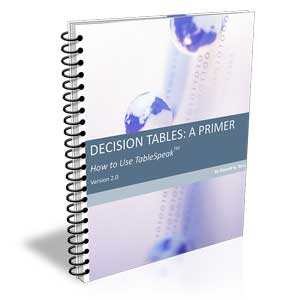The Decision Center ~ A Center of Excellence for Coordinating Business Rules and Other Process 'Smarts'
My last four columns have discussed various aspects of enterprise decision management (EDM)[1] and what it means for business rules and rule management. In this column, I explore some organizational implications, leading me to introduce the idea of the Decision Center.
Let me recap that previous discussion briefly. A basic insight of EDM is that operational decisions provide the actual value-add for the business — not the rules used to make those decisions per se. In other words, rules are simply the means to some important business end, some operational decision(s) to be made. So if you want to make the business and its processes smarter (and who doesn't!?), you must enable better decisions. That's a great insight.
To support smarter decisioning, your business needs at least two things: the right kinds of platform, and the right kinds of techniques and organizational skills. These two things are often confused, but let me sort that out later.
The Decision Center focuses squarely on the latter — the right kinds of techniques and skills. It's fundamentally an organizational idea. These techniques and skills naturally start with business-side rule analysis and rule management, but because EDM takes a full-loop view of decisioning, you must add techniques and skills involved in business intelligence (BI), data mining, and analytics. These capabilities enable the business to gain new insights about how to improve its operational decisions. Strange bedfellows? They may seem so at first, but let's have a closer look.
EDM-style, full-loop decisioning involves four fundamental stages, as follows.
- Execute occurs in business processes, where decisions are actually made.
- Capture is usually supported by a data warehouse, which allows consolidation and historical trails.
- Analyze is accomplished through BI, data mining, dashboards, predictive analytics, and similar tools through which new insights can be gained about how to improve operational decisions. (By the way, note that I didn't say new insights about the data — that would clearly miss the mark.)
- Deploy is where business rules and rule engines come to play. Naturally, you want to turn new insights into action (revised/improved decisions) in the quickest, most agile, and most traceable way possible. Unfortunately, deploy is where many companies fall down. They spend large sums pursuing insight (look at data warehouse budgets!), but then lack the infrastructure needed to exploit that insight effectively (read "deploy it"). I call this the deployment gap. If your company seems on a wild ride toward active data warehouses, MDM, CDI or similar things, but lacks a business rule initiative, take heed!
Moving toward the EDM-style, full-loop view of decisioning naturally produces organizational challenges. It will not happen overnight. You need to evolve an organizational strategy that encourages and disseminates the right mix of full-loop skills and techniques. You will need a new center of excellence — the Decision Center.
I want to be very clear what a Decision Center is not. First, it is not the execute part of the organization; that is, it's not where operational decisions are actually made on a minute-to-minute basis. Rather, it's where the techniques and skills needed to improve and deploy decisions (or rather, deploy the rules to make the decisions) are managed.
A Decision Center is also not any particular platform(s) or IT infrastructure. That's where the confusion I mentioned earlier arises. For example, perhaps you have heard or read about universal decision engines or decision service hubs.[2] These ideas are clearly about IT/ platform things. They may indeed have merit; however, to succeed with EDM, companies will need to keep a sharp eye to what organizational adjustments are required. (As one example, just consider the reorientation needed to get data mining staff focused on rapid, rule-based deployment of new insights!)
The Decision Center is a center of excellence where operational decisions are enabled (not made). It is where organizational expertise is gathered and developed to support, optimize, and enhance full-loop decisioning. It is also where business-oriented rule management happens, and where elements of business guidance are actualized into deployable form. Finally, it is where the compliance infrastructure is established for maintaining 'rules of record'. Read more about that new idea in next month's column.References
[1] For a complete discussion, refer to: James Taylor and Neil Raden, Smart (Enough) Systems: How to Deliver Competitive Advantage by Automating Hidden Decisions, Prentice-Hall (June 2007), ISBN: 0132347962.![]()
[2] A related term is policy hub, which seems to be a hybrid of sorts. Refer to: Policy Hubs: Progress Toward Decision-Centric BI, by Henry D. Morris and Dan Vesset, IDC #30849.![]()
# # #
About our Contributor:
Online Interactive Training Series
In response to a great many requests, Business Rule Solutions now offers at-a-distance learning options. No travel, no backlogs, no hassles. Same great instructors, but with schedules, content and pricing designed to meet the special needs of busy professionals.










How to Define Business Terms in Plain English: A Primer
How to Use DecisionSpeak™ and Question Charts (Q-Charts™)
Decision Tables - A Primer: How to Use TableSpeak™
Tabulation of Lists in RuleSpeak®: A Primer - Using "The Following" Clause
Business Agility Manifesto
Business Rules Manifesto
Business Motivation Model
Decision Vocabulary
[Download]
[Download]
Semantics of Business Vocabulary and Business Rules